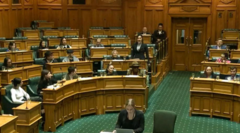The proposed law seeks to allow assisted dying under strict conditions, marking a significant shift in France’s approach to end-of-life options.
French Parliament Advances Bill on Assisted Dying Rights

French Parliament Advances Bill on Assisted Dying Rights
New legislation for terminally ill patients awaits Senate approval after National Assembly vote.
French Members of Parliament (MPs) have cast their votes in favor of a groundbreaking proposal that would grant specific individuals in the final stages of terminal illness the right to assisted dying. The National Assembly's decision, which saw 305 votes in favor and 199 against, now moves the bill forward to the Senate before undergoing a second review in the National Assembly. Advocates are optimistic that the legislation could be enacted by 2027, positioning France as the eighth country within the European Union to permit some form of assisted dying.
The proposed French framework will differ from the more liberal approaches seen in the Netherlands and Belgium—the pioneering nations to legalize such practices in Europe. Concurrently, there was an unopposed passage of a bill affirming the right to palliative care, addressing a significant gap in the current healthcare system where approximately 48% of patients needing such care go without.
President Emmanuel Macron lauded the decision for both bills as a pivotal moment for social progress, noting through a social media post, "With respect for sensitivities, doubts, and hopes, the path of fraternity that I hoped for is gradually opening up." The primary discussions during the two-week legislative debate largely focused on the eligibility criteria for patients wishing to access assisted dying.
Under the approved terms, patients who are diagnosed with a serious, incurable disease that is considered "life-threatening and in its advanced or terminal phases," and who experience "constant physical or psychological suffering," may apply for assisted dying. The procedure mandates that patients must independently indicate their intent, followed by a 48-hour contemplation period before reconfirmation.
Patients who proceed would administer the lethal dose themselves or receive assistance from a medical professional if necessary. A doctor’s approval would be required, following a consultation with fellow practitioners.
The vote, reflecting a personal stance from MPs rather than party alignment, garnered support primarily from center and left-wing factions, while facing resistance from right-wing and populist groups. Critics, particularly conservatives and representatives of the Catholic Church, expressed concerns regarding the potential for the bill’s broad definitions to lead to assisted dying for patients with more time to live than initially assessed.
Additionally, fears have been articulated about vulnerable elderly individuals feeling pressured to opt for assisted dying to alleviate burdens on their families. Protests erupted outside the National Assembly, showcasing diverse opinions, including a poignant statement from a woman suffering from Parkinson's disease who likened the bill to "a loaded pistol left on my bedside table."
Some progressive lawmakers proposed amendments to expand access to assisted dying for minors and non-nationals, as well as for patients who outline their wishes before entering a coma. Importantly, medical personnel who object to facilitated dying aren't compelled to participate, although attempting to block an assisted dying act would become a prosecutable offense, carrying a penalty of up to two years in prison for those found guilty.
Nevertheless, the proposition to classify incitement to assisted dying as a separate crime was rejected during discussions. Prime Minister François Bayrou, a practicing Catholic, shared that he would abstain from voting on the bill had he been a member of the assembly.
The ongoing debate reflects deep societal divides on assisted dying, with general sentiments articulated by healthcare professionals revealing a spectrum of opinions on the ethical implications of such legislation.
The proposed French framework will differ from the more liberal approaches seen in the Netherlands and Belgium—the pioneering nations to legalize such practices in Europe. Concurrently, there was an unopposed passage of a bill affirming the right to palliative care, addressing a significant gap in the current healthcare system where approximately 48% of patients needing such care go without.
President Emmanuel Macron lauded the decision for both bills as a pivotal moment for social progress, noting through a social media post, "With respect for sensitivities, doubts, and hopes, the path of fraternity that I hoped for is gradually opening up." The primary discussions during the two-week legislative debate largely focused on the eligibility criteria for patients wishing to access assisted dying.
Under the approved terms, patients who are diagnosed with a serious, incurable disease that is considered "life-threatening and in its advanced or terminal phases," and who experience "constant physical or psychological suffering," may apply for assisted dying. The procedure mandates that patients must independently indicate their intent, followed by a 48-hour contemplation period before reconfirmation.
Patients who proceed would administer the lethal dose themselves or receive assistance from a medical professional if necessary. A doctor’s approval would be required, following a consultation with fellow practitioners.
The vote, reflecting a personal stance from MPs rather than party alignment, garnered support primarily from center and left-wing factions, while facing resistance from right-wing and populist groups. Critics, particularly conservatives and representatives of the Catholic Church, expressed concerns regarding the potential for the bill’s broad definitions to lead to assisted dying for patients with more time to live than initially assessed.
Additionally, fears have been articulated about vulnerable elderly individuals feeling pressured to opt for assisted dying to alleviate burdens on their families. Protests erupted outside the National Assembly, showcasing diverse opinions, including a poignant statement from a woman suffering from Parkinson's disease who likened the bill to "a loaded pistol left on my bedside table."
Some progressive lawmakers proposed amendments to expand access to assisted dying for minors and non-nationals, as well as for patients who outline their wishes before entering a coma. Importantly, medical personnel who object to facilitated dying aren't compelled to participate, although attempting to block an assisted dying act would become a prosecutable offense, carrying a penalty of up to two years in prison for those found guilty.
Nevertheless, the proposition to classify incitement to assisted dying as a separate crime was rejected during discussions. Prime Minister François Bayrou, a practicing Catholic, shared that he would abstain from voting on the bill had he been a member of the assembly.
The ongoing debate reflects deep societal divides on assisted dying, with general sentiments articulated by healthcare professionals revealing a spectrum of opinions on the ethical implications of such legislation.






















